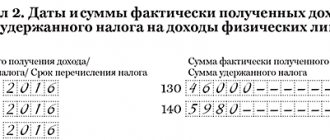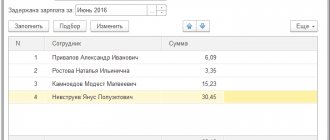What does the Labor Code of the Russian Federation say about the timing of payment of wages in 2021 - 2021
Salary terms are fixed in Art. 136 Labor Code of the Russian Federation. According to it, money for employees’ work should be transferred to:
- at least every half month; And
- no later than 15 calendar days from the end of the period for which the payment was accrued.
If the salary date approved by the employer falls on a weekend, the money is issued the day before.
IMPORTANT! Norms Art. 136 of the Labor Code of the Russian Federation are mandatory and cannot be violated even at the written request of an employee who wishes to receive money once a month.
As a rule, employers pay wages according to the following scheme: once a month they issue an advance and once a month the final payment, adjusted to the previously issued advance. With such a schedule and taking into account the norms of Art. 136 of the Labor Code of the Russian Federation, the deadlines for salaries for the first half of the month fall on the 16th–30th (31st), and for the second half - on the 1st–15th.
IMPORTANT! For large companies with a large number of structural divisions and a large staff, it is not prohibited to approve different salary payment dates for different departments (letter of Rostrud dated June 20, 2014 No. PG/6310-6-1).
All aspects of paying advances to new employees are in the article “Advance to a new employee in the first month of work.”
Early payment of salaries for December 2018
Do employers have the right to pay all wages for December 2018 before the New Year 2021? After all, many employees really count on this. Yes, the employer can accommodate employees and pay them wages for December 2021 before the New Year holidays. Moreover, this can be done even if the payment of the second part of the December salary does not fall during the New Year holidays in January 2021.
The Labor Code of the Russian Federation establishes liability for late payment of wages to employees. If wages are paid earlier, this does not violate the rights of workers. Therefore, the employer cannot be held liable for early payment of the December salary.
The entire December salary can be paid in December 2021 on one day. For example, on the day of payment of the advance. It is not at all necessary to pay an advance, for example, on December 15, 2021, and then wait until December 29 to pay the second part of your earnings. However, this issue remains at the discretion of the employer.
There is no need to be afraid of a fine for paying your salary ahead of time. It doesn’t matter for what reason the organization violated the regularity of payments - due to upcoming weekends and holidays or just like that. The Ministry of Labor reported this in a letter dated December 6, 2021 No. 14-1/B-1226. Salaries must be paid at least every half month (Article 136 of the Labor Code of the Russian Federation). Violation of this rule may result in a fine of up to RUB 50,000. (Part 6 of Article 5.27 of the Code of Administrative Offenses of the Russian Federation). Officials assure that it does not apply in the case of early salary. After all, it turns out that employees will receive money even earlier than in half a month. This does not infringe on workers' rights.
Note that if the employer issues the December salary in December 2021, then three payments will fall for this month: the salary for November, the advance payment and the salary for December. However, this is not a violation. According to the law, salaries cannot be paid less than twice a month. More often - allowed!
What documents indicate the days of payment of wages?
The employer is obliged to fix a specific schedule for the transfer of salary money in its local regulations (LNA): internal labor regulations (ILR), collective or labor agreement. It is these 3 documents that Art. 136 Labor Code of the Russian Federation.
The wording of this article is designed in such a way that the question often arises: is it necessary to fix salary terms in all of the above documents or is one of them sufficient? The answer to it was repeatedly given by both officials and judges (letter of Rostrud dated March 6, 2012 No. PG/1004-6-1, ruling of the Moscow City Court dated December 24, 2012 No. 4g/5-12211/12).
For information on what to include in an employment contract, read the article “Procedure for concluding an employment contract (nuances).”
According to the explanations, it is enough that the deadlines are fixed in one of those given in Art. 136 Labor Code of the Russian Federation documents. Moreover, according to Rostrud, PVTR is a priority. He explains this by saying that the PVTR is a general document, the norms of which apply to all personnel, while an employment contract regulates relations with a specific employee, and a collective agreement may not be concluded at all.
In order to completely eliminate disputes with inspectors, you can do the following: fix the rules for issuing wages in the PVTR, and add a phrase in labor or collective agreements that refers to the PVTR: “salaries are issued in accordance with clause (here we indicate the clause number of the PVTR) of the rules labor regulations..."
Want another expert opinion? Sign up for a free trial of ConsultantPlus or, if available, proceed to the Salary Guide.
Procedure for paying December salaries
Pay employees' salaries for December 2021 in the manner established by the labor or collective agreement or in the internal labor regulations:
- or cash;
- or transfer to employee cards.
At the same time, we recommend keeping in mind that the period for crediting money to employees’ cards depends on the length of the bank’s operating day and on when the organization transferred the money. The exact terms of crediting, of course, must be specified in the agreement for servicing bank cards. Most often, money arrives at card accounts the next day after the organization transfers it. Thus, in order for employees to accurately receive their salaries for December, for example, on December 29, it makes sense to submit the payment order to the bank no later than December 28, 2021.
In our opinion, there is no need to postpone payments directly until December 29th. The fact is that at the end of the year banks make a lot of payments. Moreover, December 30 is a non-working day (Sunday). Therefore, it is possible that the payment will not be processed in time if you submit the payment to the bank directly on December 29. And then, to put it mildly, a not very good situation may develop - the employee did not receive the money until January 9, 2021.
If the vacation is immediately after the New Year holidays
An employee can take a vacation immediately after the New Year holidays. For example, from January 9. In this case, vacation pay must be accrued and issued in 2021, no later than December 29. The same must be done if the employee goes on vacation on January 10 or 11. After all, vacation pay must be issued no later than three calendar days before the start of the vacation (Article 136 of the Labor Code of the Russian Federation). If this deadline falls on a weekend or holiday, then it must be moved to the nearest previous working day.
What to consider when setting payroll dates
Before approving salary dates, consider the possible risks and tax consequences. There are a number of slippery points that you should pay attention to:
- The expressions “every half month” and “twice a month” should not be confused. For example, the numbers 3 and 16 fit the definition of “twice a month,” but the rule of not exceeding a gap of 15 days is not followed here, since from the 16th to the 3rd it is more than half a month.
- It is dangerous to choose not clear dates, but a time period - for example, from the 1st to the 5th, as well as deadlines, for example, no later than the 5th and 25th. Firstly, Art. 136 of the Labor Code of the Russian Federation speaks of the need to establish specific dates, and secondly, there is a risk of confusion and exceeding the six-month interval between payments. The illegality of this approach is stated in the letter of the Ministry of Labor of the Russian Federation dated November 28, 2013 No. 14-2-242, the resolution of the Supreme Court of the Russian Federation dated May 15, 2014 No. 3-AD14-1, the ruling of the Trans-Baikal Regional Court dated September 5, 2012 No. 33-2867-2012.
- An insufficiently defined phrase will also be unsafe, for example: “salaries are paid no later than the 5th and 20th of each month.” After all, it is impossible to understand from such a phrase when an advance is given and when the final amount is given.
- When choosing convenient dates, you need to take into account the requirements of the Tax Code of the Russian Federation. Thus, the 15th day for the final payment turns out to be inconvenient, since the advance payment in this case falls on the 30th day, and this is the last day in many months. From the advance paid on the last day of the month, personal income tax will have to be withheld (clause 2 of Article 223 of the Tax Code of the Russian Federation, determination of the Supreme Court of the Russian Federation dated May 11, 2016 No. 309-KG16-1804). But in months that have 31 days, this is not necessary. This will create confusion for both the accountant and controllers.
To learn how to reflect the tax withholding date in 6-NDFL, read this article.
Is it permissible to pay salaries more than twice a month?
Yes, definitely. The Labor Code directly states that salaries are paid “at least every half month.” This means that restrictions are placed only on rarer payments to employees, but not on more frequent ones (letters from the Ministry of Labor of the Russian Federation dated 02/03/2016 No. 14-1/10/B-660, dated 12/06/2016 No. 14-1/B-1226 ).
If you wish, you can issue money not twice a month, but weekly and even daily. However, before switching to a more frequent frequency of salary payments, it is worth considering the feasibility of this: whether such a schedule will be convenient and beneficial for both employees and the employer himself.
Practice shows that this is beneficial for those employers who employ temporary staff; in other cases, the benefits of more frequent payment of money are completely unobvious, if not completely absent.
For information on how to conclude an agreement with a temporary worker, read the material “Art. 59 of the Labor Code of the Russian Federation: questions and answers.”
The weekly payment does not excite the staff either: according to repeated statistical surveys, the majority of employees would like to maintain a 2-time salary schedule.
Is it legal to pay wages ahead of schedule?
It is only legal if the payday falls on a weekend. In other cases, despite the fact that there is no violation of the rights of employees, it is not recommended to pay money earlier than approved by the employer’s LNA. This is fraught with claims from the labor inspectorate and the imposition of a fine.
As we have already found out, the Labor Code of the Russian Federation requires that the dates of payment of wages be clearly recorded in the employer’s LNA. By paying wages ahead of the approved date, strictly speaking, you will have to make appropriate changes to the LNA. However, it is unlikely that anyone will think about a global reworking of documents if the manager occasionally wants to meet employees halfway and issue, for example, a salary before the holidays (while the salary payment period falls on the day after the holiday). In addition, this may lead to an increase in the half-month period between payments, which is also not allowed.
Therefore, although the manager allowed the earlier payment of wages in the interests of the employees themselves, formally this situation is considered a violation (Part 1 of Article 142 of the Labor Code of the Russian Federation) and may lead to fines (Part 1 of Article 5.27 of the Code of Administrative Offenses of the Russian Federation). However, the risk of prosecution here is still small.
Any deviation from the 15-day interval when paying wages is a violation
Paying wages ahead of the company's deadline is not a crime in itself.
However, usually after this, employees receive the second part of their salary less often than every half month. And this is already a violation of the rules for settlements with employees (part six of Article 136 of the Labor Code of the Russian Federation). The break between salary payment days should be no more than 14–16 days, taking into account 28/29, 30 or 31 days in a month. Otherwise, the company does not respect the employee’s right to regular payment. Labor inspectors adhere to this position.
The employer is obliged to pay wages on time and in full (paragraph 7, part two, article 22 of the Labor Code of the Russian Federation). As a general rule, at least every half month (part six of Article 136 of the Labor Code of the Russian Federation). More often it is possible. Specific days are determined in the PVTR, collective or labor agreement.
It is interesting that in the Code of Administrative Offenses there is a special punishment for the fact that the organization did not pay wages or did not pay them in full on time (Parts 6, 7, Article 5.27 of the Code of Administrative Offenses of the Russian Federation). But early payment does not fall under these cases.
Therefore, when the inspector sees that the company has paid wages in advance, he applies the general rule for violation of labor laws (Part 1 of Article 5.27 of the Code of Administrative Offenses of the Russian Federation). As a result, it may issue a warning or fine the manager 1,000–5,000 rubles, the company 30,000–50,000 rubles. A repeated violation will lead not only to fines, but also to disqualification of the manager (Part 2 of Article 5.27 of the Code of Administrative Offenses of the Russian Federation).
We are aware of fines for early salaries not only in St. Petersburg, but also in other regions. Communication with colleagues and analysis of court decisions confirms this (decision of the St. Petersburg City Court dated April 4, 2021 No. 7-572/2017 in case No. 12-160/2016).
Days on which it is safe to issue salaries (part six of Article 136 of the Labor Code of the Russian Federation)
| Salary | Month | Day of the month | ||||||||||||||
| For the first half of the month worked | Current | 16 | 17 | 18 | 19 | 20 | 21 | 22 | 23 | 24 | 25 | 26 | 27 | 28 | 29 | 30 |
| Final payment at the end of the month | Next | 1 | 2 | 3 | 4 | 5 | 6 | 7 | 8 | 9 | 10 | 11 | 12 | 13 | 14 | 15 |
What are the consequences of violating wage payment deadlines?
The employer's liability for such violations can be of two types: material and administrative.
Administrative liability applies only if the employer is at fault.
Primary administrative punishment (clause 1 of article 5.27 of the Administrative Code):
- warning or fine of 1,000–5,000 rubles. for officials;
- fine for the culprit - individual entrepreneur - 1,000–5,000 rubles;
- fine for the culprit legal entity - 30,000–50,000 rubles.
Repeated administrative punishment (clause 2 of article 5.27 of the Administrative Code):
- disqualification for 1–3 years or a fine of 10,000–20,000 rubles. for officials;
- fine for the culprit - individual entrepreneur - 10,000–20,000 rubles;
- fine for the culprit legal entity - 50,000–70,000 rubles.
Financial liability (Article 236 of the Labor Code of the Russian Federation) is expressed in monetary compensation for each day of delay, calculated from 1/150 of the key rate of the Central Bank of the Russian Federation of the amount due for payment (minus personal income tax). This is the minimum amount of compensation, but the employer has the right to assign a larger amount. No application from the employee is required to receive it - it must be paid along with the delayed amounts.
IMPORTANT! Maternity compensation is paid regardless of whether the employer is to blame for violating salary deadlines.
In what other cases is the employer liable for financial liability? This publication will tell you.
Failure to comply with salary payment deadlines
According to Art. 236 of the Labor Code of the Russian Federation, for late payment of wages to workers in 2021 entails financial liability for the employer.
Increasing the amount of compensation
According to the current Labor Code of the Russian Federation, compensation for late payment of wages to an employee is several percent of the amounts that are not transferred to the worker on a specific day. From October 3, 2016, the amount of compensation has been increased.
Before the increase, the compensation payment was equal to 1/300 of the discount rate of the Central Bank of the Russian Federation for 1 overdue day.
After the increase, the compensation is equal to 1/150 of the discount rate of the Central Bank of the Russian Federation for 1 overdue day.
Increasing the amount of fines
The amount of fines for late payment of wages has increased since October 3, 2021. For 2021, the amounts of penalties are reflected below:
| Who can be fined | Amount of fine from 10/03/2017 | Amount of fine until 03.10.2017 |
| Officials | 10 – 20 thousand rubles. In case of a secondary violation of the Federal Law: 20 - 30 thousand rubles. | 1 – 5 thousand rubles. |
| Business managers | 30 – 50 thousand rubles. For a secondary violation: 50 – 100 thousand rubles. | 30 – 50 thousand rubles. |
| Individual entrepreneurs - employers | 1 – 5 thousand rubles. For a secondary violation: 10 – 30 thousand rubles. | 1 – 5 thousand rubles. |
It should also be remembered that the employer bears financial responsibility if the workers’ salary is set at a level less than the minimum wage.
From January 1, 2021, the minimum wage is 11,280 rubles. At the same time, the minimum wage in certain regions of the Russian Federation may differ from this figure.
If a manager pays a worker a salary below the minimum wage, then the regulatory authorities issue him a fine of 30–50,000 rubles. However, if the minimum wage is limited within 1 region, then employers can focus on it.
According to Art. 142 of the Labor Code of the Russian Federation, if the employer does not pay wages for more than 15 days, the worker can perform the following actions:
- notify the head of the company about the delay in writing;
- stop working at the workplace;
- do not show up for work until the accountant transfers the salary to the card.
In such a situation, it does not matter whether the delay in transferring the salary was the fault of the employer or whether the director of the company is not to blame for what happened.
For your information
According to Art. 142 of the Labor Code of the Russian Federation, the manager must also pay the worker for downtime.
An employee does not have the right to boycott his work in case of late wages in the following cases:
- when martial law is introduced in the country;
- if the worker is a civil servant;
- if a worker works in a hazardous industry that ensures the vital functions, defense and security of the country, eliminates emergencies, natural disasters, carries out emergency and rescue operations to search for people;
- if the worker works in law enforcement or in the fire service.
How to make changes to documents and set the correct deadlines for paying wages
If for some reason you do not have LNA regulating the timing of salary transfers, they need to be done as quickly as possible. If the necessary LNAs exist, but the dates in them are indicated incorrectly, this should be promptly corrected:
- If possible, redo the document, but only if doing so will not cause inconsistencies with your other documentation.
- In order to change the collective agreement, assemble a commission of representatives of both parties - employees and employer. Document the results of the negotiations between the commission members in an additional agreement, in which you indicate the new salary terms.
- If salary dates were included in employment contracts, you will have to draw up additional agreements for each of them.
- Changes in the terms of payment of wages included in the PVTR are the easiest to formalize - to do this, it is enough to issue an order, which should be familiarized to each employee against signature.
You can see what such an order looks like here:
Results
The frequency of payment of wages is established by Art. 136 Labor Code of the Russian Federation. It also obliges employers to set clear deadlines for issuing wages in the LNA. Failure to comply with these deadlines (or the absence of regulatory deadlines) falls under the articles of the Labor Code of the Russian Federation and the Code of Administrative Offenses of the Russian Federation on material and administrative liability.
Sources:
- Tax Code of the Russian Federation
- Labor Code of the Russian Federation
- Code of Administrative Offenses of the Russian Federation
You can find more complete information on the topic in ConsultantPlus. Free trial access to the system for 2 days.







